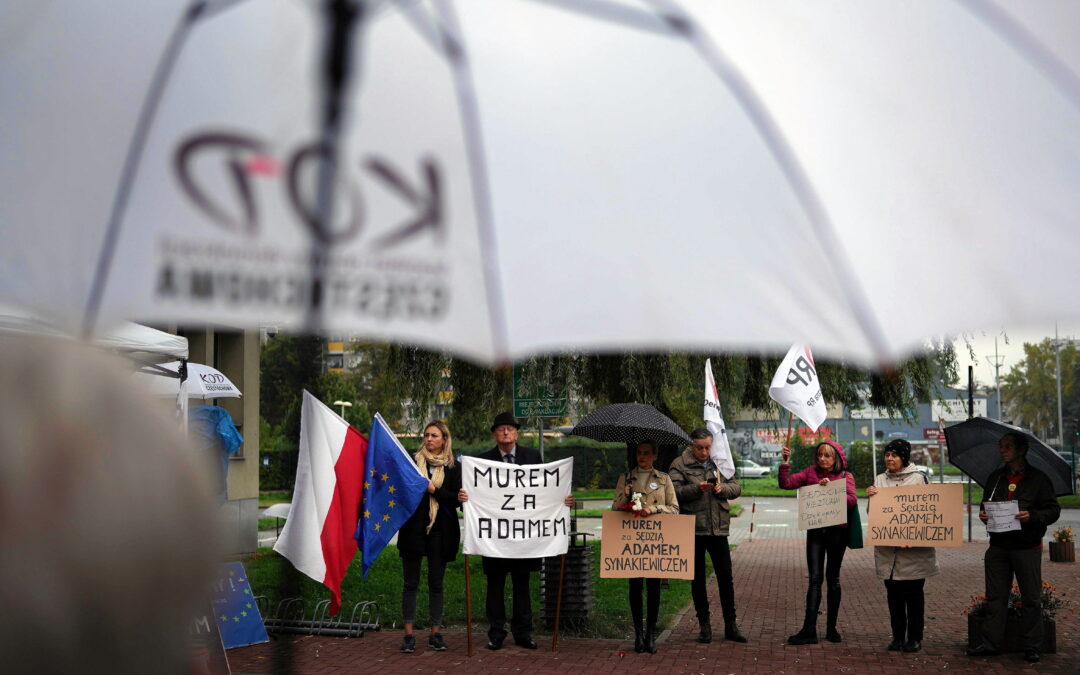Disciplinary proceedings have been launched against four judges who attended an event organised by an NGO that has campaigned against the Polish government’s judicial policies.
They are accused of engaging in political activity by participating in the meeting, where opposition leader Donald Tusk was among the speakers. If found guilty, they could be removed from office.
The decision to launch proceedings was announced today by Piotr Schab, the chief disciplinary commissioner for common court judges. “Stop the political activity of judges,” tweeted his deputy, Przemysław Radzik. “Such actions deprive a judge of the qualities of impartiality and independence.”
Stop politycznej aktywności sędziów. Taka działalność pozbawia sędziego przymiotów bezstronności i niezależności. Więcej informacji w komunikacie RDSSP @SchabPiotr. https://t.co/yWVQD7N0Yf
— Przemysław W. Radzik (@ZRDSSP_Radzik) February 21, 2022
The judges in question – Dorota Zabłudowska, Waldemar Żurek, Paweł Juszczyszyn and Piotr Gąciarek – in November attended a convention organised by the Committee for the Defence of Democracy (KOD) in Warsaw.
The event was held to mark the sixth anniversary of the founding of KOD, which emerged shortly after the national-conservative Law and Justice (PiS) party came to power. It has since then regularly led protests against PiS policies, especially its overhaul of the judiciary.
The judges who attended have themselves expressed their opposition to the government’s judicial policies. During a speech from the stage, one of them, Żurek, declared: “We will restore democracy, restore the rule of law and bring the criminals to justice.” His words were met with a round of applause.
Gość, który buja się po politycznych spędach nie powinien już nigdy wydać wyroku w imieniu Rzeczypospolitej Polskiej. pic.twitter.com/7mAJ0U0uZE
— Maciej Stańczyk (@stanczykmaciej) November 27, 2021
Their participation was criticised at the time by figures from the ruling camp. “The mask has slipped,” said deputy justice minister Sebastian Kaleta. “Further proof that the judiciary has been politicised…That is why it is necessary to return to the path of hard reform.”
The PiS-led government has regularly argued that its judicial policies are necessary to remove judges linked to the “post-communists” that have dominated Poland since 1989. However, PiS has itself regularly appointed judges linked to its own political camp, including placing two of its former MPs on the constitutional court.
Na politycznym wiecu KODu z udziałem @donaldtusk brylowali także sędziowie z @JudgesSsp.
Kolejny dowód na to, że sądownictwo w Polsce było upolitycznione przed 2015, ale się wtedy trochę kryli. Dzisiaj widzimy, że maski opadły.
Dlatego trzeba wrócić na szlak twardych reform. pic.twitter.com/mGUtHg9Hrs
— Sebastian Kaleta (@sjkaleta) November 28, 2021
Speaking to Dziennik Gazeta Prawna last year, one of the judges who attended the KOD event, Gąciarek, claimed that there was nothing wrong with his presence there. He argued that KOD is a social movement, not a political one, and noted that it “defends courts and judges”.
“Does judicial independence mean that judges are to be silent, without the right to criticise bills that violate the rule of law?” he asked. “Judges have the right to debate and dialogue…The courtroom cannot be the only place where they can speak.
Regarding the fact that Tusk spoke at the event, Gąciarek admitted that “a judge, as a rule, should not participate in political speeches”. However, he noted that he “was not informed about” Tusk’s speech in advance and “had no influence on” the fact that it happened.
Udział sędziów w urodzinach KOD. Gąciarek: Nie miałem wpływu na przemówienie Tuska [WYWIAD]https://t.co/pnNaN3mhME
— Dziennik Gazeta Prawna (@DGPrawna) December 2, 2021
Three days after the KOD meeting in November, Schab announced that he had begun an investigation into the participation of the four judges.
Today, his office announced that it was launching disciplinary proceedings “in connection with their participation in the political meeting…where they publicly manifested their political convictions and views and actively expressed their approval for the political content expressed there”.
This, noted the statement, contravenes Article 178(3) of the constitution, which forbids judges from “public activities incompatible with the principles of independence of the courts and judges”.
If found to have acted in a manner inconsistent with judicial independence then, under the law on common courts, the judges could be punished by being moved to a different function or even removed from office altogether, notes Schab.
In response, two of the judges, Gąciarek and Zabłudowska, tweeted brief statements saying they “do not practise politics”. Zabłudowska added that she “serves Polish citizens who are deprived of their right to an independent court”.
Nazywam się Dorota Zabłudowska (nie Dorota Z.),jestem sędzią Sądu Rejonowego Gdańsk-Południe w Gdańsku i członkinią @JudgesSsp. Nie uprawiam polityki i nie prezentuję postawy służebnej wobec polityków. Służę polskim obywatelom, którym odbiera się prawo do niezależnego sądu. https://t.co/RVWkFU90dl
— Dorota Zabłudowska (@Zabudowska) February 21, 2022
The PiS government has been accused by a range of domestic and international organisations of violating the rule of law through its judicial policies, including by implementing a tougher new disciplinary regime for judges. That regime has also been found to be unlawful by European courts.
While PiS argues that the system is necessary to bring order to the judiciary, hold judges to account, and improve the functioning of courts, the opposition and many analysts see it as a means of intimidating judges and bringing courts under greater political control.
The Court of Justice of the European Union last year ordered Poland to immediately suspend the functioning of its disciplinary chamber for judges. The government has, however, still not done so, resulting in daily fines of €1 million.
Main image credit: Grzegorz Skowronek / Agencja Gazeta

Daniel Tilles is editor-in-chief of Notes from Poland. He has written on Polish affairs for a wide range of publications, including Foreign Policy, POLITICO Europe, EUobserver and Dziennik Gazeta Prawna.




















